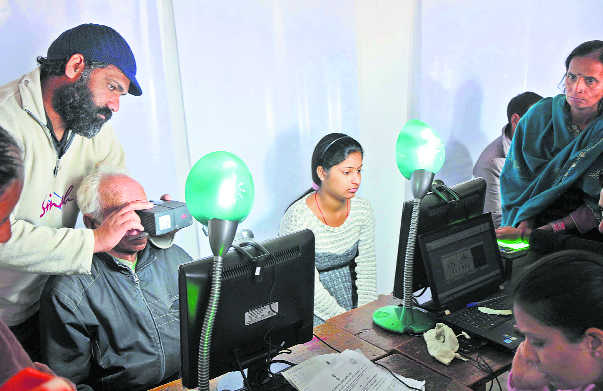
Suhas Chakma
Human rights activist
A five-member constitutional Bench of the Supreme Court of India is scheduled to hear from January 17 a batch of petitions challenging the validity of the Aadhaar Act, including mandatory linkage of the biometric identity of each and every individual residing in India. The Bench has already held that the right to privacy is a fundamental right.
Aadhaar was launched by the UPA government as a voluntary initiative to prevent pilferage of services and social welfare schemes offered by the government. The NDA government led by Narendra Modi turned Aadhaar into an instrument of surveillance, ostensibly to uncover black money and tax evasion. It introduced the Aadhaar (Targeted Delivery of Financial and Other Subsidies, Benefits and Services) Act of 2016 as a money Bill.
The negative impact of the mandatory requirement of Aadhaar card for access to subsidies and benefits will be raised in the hearing. Whether the loose definition of service as "any provision, facility, utility or any other assistance provided in any form to an individual or a group of individuals and includes such other services as may be notified by the Central Government" meets the test of fairness, reasonableness and rationality will be seen. However, it is clear that aim of the Aadhaar Act stands violated. The Aadhaar Act defines itself as "an Act to provide for, as a good governance, efficient, transparent, and targeted delivery of subsidies, benefits and services, the expenditure for which is incurred from the Consolidated Fund of India, to individuals residing in India." By linking Aadhaar with banking, income tax returns and mobiles connections for individuals who do not receive benefits or subsidies from the Consolidated Fund of India, the aim of the Act stands violated.
Yet, what is unlikely to figure and that cannot be argued in legal parlance is the national security threats. The Modi government has not adequately deliberated upon the issue. The NDA government has focused on how it can benefit by using the Aadhaar Act, but it has not considered as to how India itself has possibly already become the target.
About a year ago, in January 2017, then Minister for Electronics and Information Technology Ravi Shankar Prasad announced that more than 111 crore people, including 99% of the India's adult population, be registered under the Aadhaar. As Aadhaar has been made mandatory for access to banking, mobiles and filing income tax returns, it implies that all public officials of India, including of the Intelligence Bureau (IB), Research and Analysis Wing (RAW) or any other security agency, had to register themselves under the Aadhaar. Their data too is currently stored with the UIDAI.
This makes the Aadhaar data of extreme interest for not only profit-seeking companies but also other governments. Counter-intelligence, including of the allies, is an integral part of the statecraft. It was none other than President Barack Obama's administration that German Chancellor Angela Markel and then Brazilian President Dilma Rousseff were wiretapped by the CIA. The hacking of the Twitter account of India's Permanent Representative to the UN Syed Akbaruddin exposes the vulnerability of any data. There is no data which is immune from hacking or illegal access.
By illegally accessing Aadhaar data and storing the same, any government can find the identity of Indian citizens. Whether an alleged Indian spy is named Hussein Mubarak Patel or Kulbhusan Yadav can easily be identified by not extracting information through torture but simply by verifying the biometric data of the alleged spy captured. The US and the United Kingdom were the first to collect biometric data of the travelers entering their country and if they have access to the Aadhaar data, they can easily identify Indian citizens, irrespective of false passports that may be issued to the intelligence agencies. Never forget the episode of Rabinder Singh, a joint secretary in the RAW who defected to the United States in 2004. It exposes the US interest in India. Whether any country has already obtained the Aadhaar data with the UIDAI illegally is a matter of conjecture and even if illegally obtained, there is no need to declare the same from the rooftop.
It is in this regard that the measures taken by the United States to protect the data that can identify the citizens are of significance to India. On January 3, 2018, it was revealed that the Trump administration had blocked Chinese billionaire Jack Ma-owned Alibaba Group Holding Ltd's Ant Financial's attempt to acquire a US money transfer company, MoneyGram International Inc, over national security concerns. The Committee on Foreign Investment in the US rejected the proposals to mitigate concerns over the safety of data that can be used to identify US citizens. There is no doubt that Aadhaar provides far more information, including biometric data, than MoneyGram International Inc requires to effect any financial transfer.
The NDA government has failed to examine these very concerns over the safety of data that can be used to identify Indian citizens. Following the exposure by The Tribune as to how Aadhaar data are cheaply available, the UIDAI, apart from seeking to silence reporting on its shortcoming by filing an FIR, has introduced temporary 16-digit virtual ID that can be used by Aadhaar holders for authentication purposes.
These initiatives are kneejerk reactions and do not address national security threats. A large number of foreign banks are currently seeking permission to operate in India as fully owned subsidies and they shall have access to data of the customers. By linking Aadhaar with basic services, India has already exposed itself and shall continue to expose the identity of its citizens, unlike the US which has refused to share data with respect to its citizens.


























